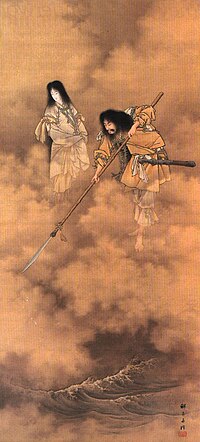Izanagi

Izanagi (イザナギ, recorded in the Kojiki as 伊弉諾, and in the Nihonshoki as 伊邪那岐; also written as 伊弉諾尊) is a deity born of the seven divine generations in Japanese mythology and Shintoism, and is also referred to in the roughly translated Kojiki as "male who invites", or Izanagi-no-mikoto.
He and his spouse Izanami bore many islands, deities, and forefathers of Japan. When Izanami died in childbirth, Izanagi tried (but failed) to retrieve her from Yomi (the underworld). In the cleansing rite after his return, he begot Amaterasu (the sun goddess) from his left eye, Tsukuyomi (the moon god) from his right eye, and Susano'o (tempest or storm god) from his nose. The story of Izanagi and Izanami has close parallels to the Greek myth of Orpheus and Eurydice, but it also has a major difference. When Izanagi looks prematurely at his wife, he beholds her monstrous and hellish state and she is shamed and enraged. She pursues him in order to kill him. She fails to do so, but promises to kill a thousand of his people every day. Izanagi retorts that a thousand and five hundred will be born every day.


